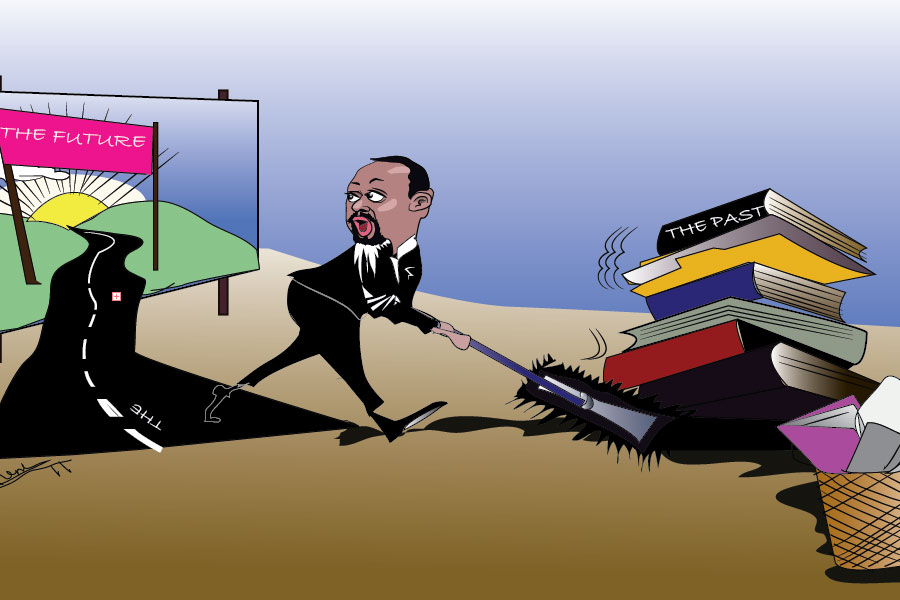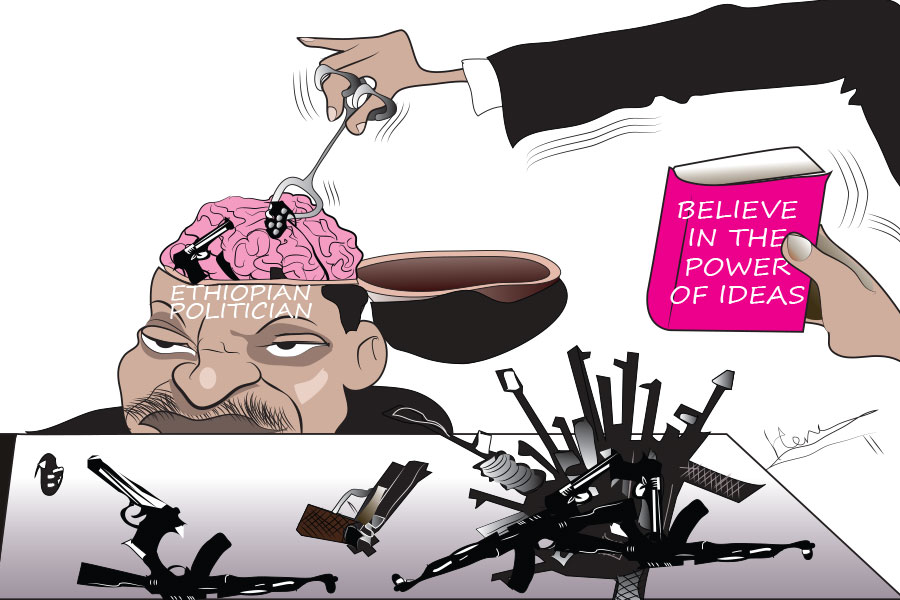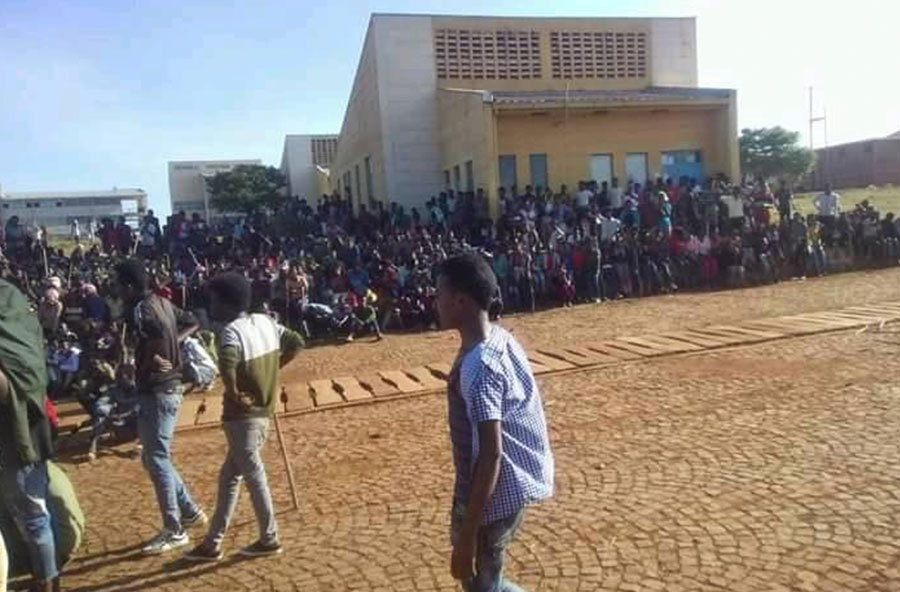
My Opinion | Dec 19,2020
May 23 , 2020
By Christian Tesfaye
There are two types of elites within Ethiopia’s marketplace of ideas. The predominant ones are the political elites, armed with the skill of communicating in local languages. On the other side are the intellectuals, who, through their education and reading, have a mesmerising handle of the English language but often have a hard time communicating their ideas to the public.
This divide was most obvious during the ongoing debate that is taking place on the constitutional conundrum the nation faces. Following parliament’s decision to push the matter to the Council of Constitutional Inquiry, which advises the House of Federation, for interpretation, there have been televised hearings to collect opinion from constitutional and legal professionals.
These hearings are one of the few examples of a democratic exercise the nation has ever seen. There has not been a time when the spirit and intent of the Constitution has been respected to such a degree.
But there was a problem. A number of the experts that had been invited to the hearing left something to be desired in terms of getting their ideas across. Often, they could be seen reaching for words, searching for the correct legal terms in Amharic and failing at it.
One of the more authoritative speakers was Tedesse Lencho (PhD), an assistant professor at Addis Abeba University's School of Law & Governance. He was honest about the dilemma he faced and explained that he may not be able to express all of his ideas in Amharic. He talked both in Amharic and English when he was answering questions. He felt the need to use not just English words but expressions as well.
Interestingly, many of the professionals that were present at the hearing have also been debating and writing about the constitutional crisis on social media and penning opinion pieces.
They did this in English. And they were articulate, authoritative and lucid in the arguments they were making. They are academics, and the written text is their forte. They are the most comfortable communicating in this manner.
Unfortunately, this is not a style of delivery that the public identifies with. Politicians, on the other hand, are able to get their points across and appear as if they have a good handle of the subject matter they are talking about for the simple fact that they are much better at speaking in one of the local languages. Combined with their oratorical skills, they appear authoritative and perceptive. Unfortunately, they are usually neither, but, in the absence of a challenge from the intellectual class in that same language, they are the undisputed leaders of opinion among the public.
This is not unprecedented. In every country, it is politicians that speak the language of the masses. Not the intellectuals. The latter's use of language in philosophising and theorising are so removed from a layperson's terms that they may as well be speaking to extraterrestrials. In Ethiopia’s case, this is made worse by the fact that the means of discourse by the intellectual and academic class is an entirely different language – English – than the means of communication utilised by the masses. I recognise the irony of writing this in English.
What is the purpose of an intellectual class if it cannot communicate its ideas to the public properly? What is the justification for the existence of politicians when most of what they say is logically and factually suspect?
There have been and continue to be a few out there that buck the trend. The most prominent one is perhaps the late Prime Minister Meles Zenawi. Whatever his style of exercise of power may have been, it is hard to deny that he combined oratorical skill with intellectual curiosity like few other modern-day African leaders. He had a profound understanding of political theory and Ethiopian history, which he combined with a command of at least one language, allowing him to appear confident and garner attention.
This is why the public hearings on the constitutional crisis are crucial. It may inspire greater oration among the intellectual class and an interest in political theory and jurisprudence among the politicians.
PUBLISHED ON
May 23,2020 [ VOL
21 , NO
1047]


My Opinion | Dec 19,2020

Editorial | Feb 22,2020

Fortune News | May 29,2021

Editorial | Feb 01,2019

Editorial | Jul 13,2024

Editorial | Jun 29,2019

Commentaries | Aug 08,2020

Agenda | Dec 05,2018

Viewpoints | Mar 23,2019

Editorial | Sep 06,2020

Photo Gallery | 180871 Views | May 06,2019

Photo Gallery | 171065 Views | Apr 26,2019

Photo Gallery | 162192 Views | Oct 06,2021

My Opinion | 137336 Views | Aug 14,2021

Dec 22 , 2024 . By TIZITA SHEWAFERAW
Charged with transforming colossal state-owned enterprises into modern and competitiv...

Aug 18 , 2024 . By AKSAH ITALO
Although predictable Yonas Zerihun's job in the ride-hailing service is not immune to...

Jul 28 , 2024 . By TIZITA SHEWAFERAW
Unhabitual, perhaps too many, Samuel Gebreyohannes, 38, used to occasionally enjoy a couple of beers at breakfast. However, he recently swit...

Jul 13 , 2024 . By AKSAH ITALO
Investors who rely on tractors, trucks, and field vehicles for commuting, transporting commodities, and f...

Nov 1 , 2025
The National Bank of Ethiopia (NBE) issued a statement two weeks ago that appeared to...

Oct 25 , 2025
The regulatory machinery is on overdrive. In only two years, no fewer than 35 new pro...

Oct 18 , 2025
The political establishment, notably the ruling party and its top brass, has become p...

Oct 11 , 2025
Ladislas Farago, a roving Associated Press (AP) correspondent, arrived in Ethiopia in...

Nov 2 , 2025
The National Bank of Ethiopia (NBE) has scrapped the credit-growth ceiling that had s...

Nov 2 , 2025 . By SURAFEL MULUGETA
The burgeoning data mining industry is struggling with mounting concerns following th...

Nov 2 , 2025 . By YITBAREK GETACHEW
Berhan Bank has chosen a different route in its pursuit of a new headquarters, opting for a transitional building instea...

Nov 2 , 2025 . By BEZAWIT HULUAGER
Nib International Bank S.C. has found itself at the epicentre of a severe governance...